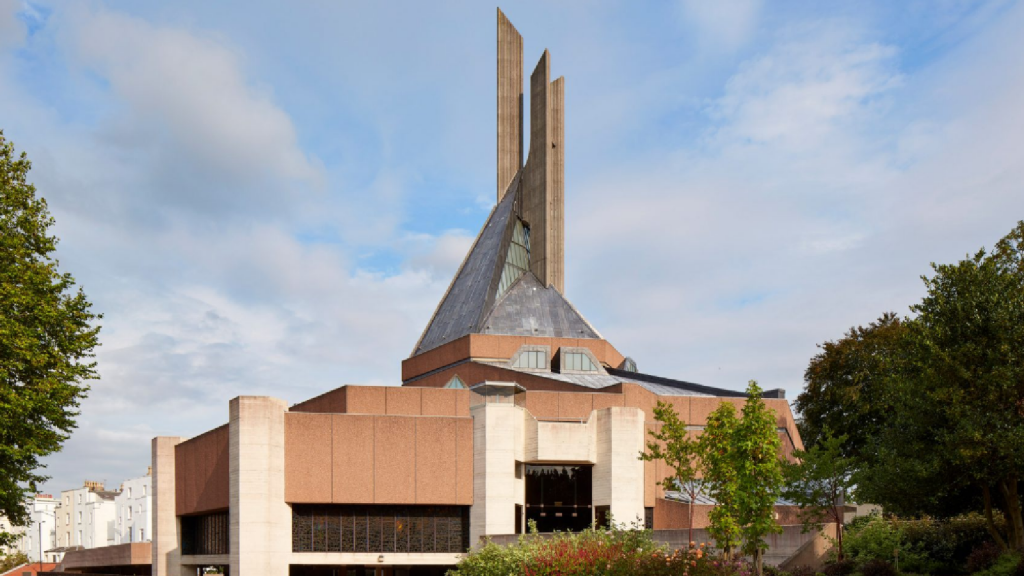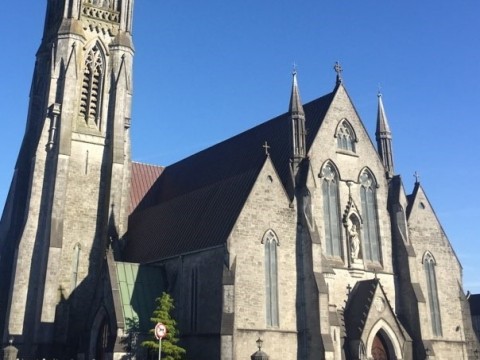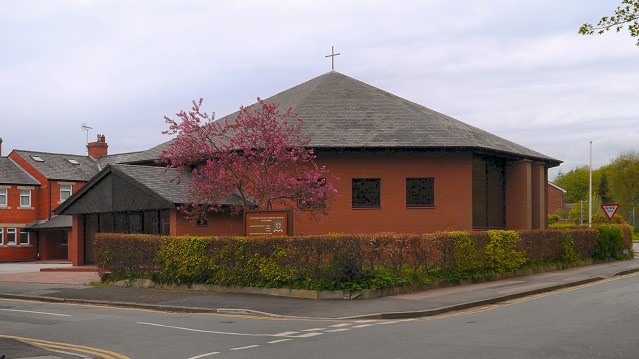Churches of the Day
Feb 7 - St Mel, bishop (d. 487)
Patrick Duffy recounts what is known about him.
Mel, a Briton, companion and relative, possibly a nephew of St Patrick. He may have been the son of Conis (or Chonis) and Saint Patrick's sister, Darerca. Saint Darerca was known as the "mother of saints" because most of her children entered religious life, some were later recognized as saints, and some became bishops. Mél and his brothers Melchu, Munis and Rioch accompanied their uncle Patrick to Ireland and helped him with his missionary work there. After St Patrick built the church at Ardagh, he appointed Mél as Bishop of Ardagh.
According to the Life of St. Brigid, Mél is said to have had no fixed see for most of his life in ministry, which fits with other accounts of his being a traveling missionary and evangelist. Acting upon the apostolic precept, Mél supported himself by working with his hands; what he gained beyond bare necessities, he gave to the poor. He is the patron saint of the combined diocese of Ardagh and Clonmacnois.
St Patrick in Ardagh
According to the Memoir of Tíreachán and the Tripartite Life, St Patrick came to Ardagh, a picturesque village in Co Longford, where he established a church. Mel, however, seems to have worked from there as a travelling missionary and evangelist.
Mel and Brigid
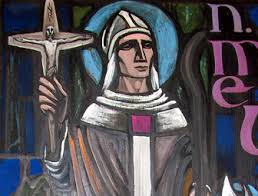 It was Mel and not Patrick who "gave Brigid the veil". The Leabhar Breac says he pronounced the rite of ordination of a bishop over her, but that when his companion Macaille protested, Mel insisted it was the work of God's providence. Brigid's successors, while not being bishops themselves, continued to have bishop's jurisdiction.
It was Mel and not Patrick who "gave Brigid the veil". The Leabhar Breac says he pronounced the rite of ordination of a bishop over her, but that when his companion Macaille protested, Mel insisted it was the work of God's providence. Brigid's successors, while not being bishops themselves, continued to have bishop's jurisdiction.Ardagh united with Clonmacnois
Ardagh, probably at first a monastic institution, was recognised as a diocese at the Synod of Kells (1152). A dispute arose as to whether it was a suffragan to Tuam or Armagh. This was resolved in 1235 in favour of Armagh. Clonmacnois was also a monastic institution until at the Synod of Kells it became a small diocese. It was at first attached to Meath, but since 1756 has been linked with Ardagh. Bishop Colm O'Reilly has been bishop of Ardagh and Clonmacnois since 1983.
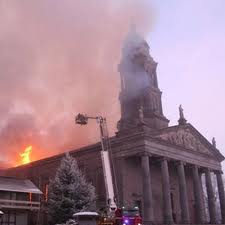 St Mel's Cathedral,
St Mel's Cathedral,College and Crozier
The Catholic Cathedral was destroyed by fire on Christmas Day 2009, but is now rebuilt, it is dedicated to St Mel, as is the nearby diocesan college. A crozier believed to have belonged to St Mel was found in the 19th century at Ardagh, near the old cathedral there. It is now kept in St Mel's College.
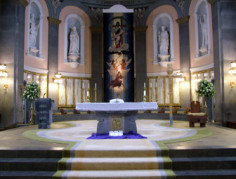
________St Mels restored in 2014________
******************************
Memorable Proverbs for today
“The first work of the whole Church
is to give the Gospel to the whole world.”
~ an anonymous experienced Irish missionary ~
**********************************
Saturday of Fourth Week in Ordinary Time, Year 2
Optional Memorial of the Bl Virgin Mary
FIRST READING
A reading from the first book of Kings 3:4-13
Give your servant a heart to understand how to discern between good and evil.
King Soloman went to Gibeon to sacrifice there, since that was the greatest of the high places - Solomon offered a thousand holocausts on that altar. At Gibeon the Lord appeared in a dream to Solomon during the night. God said, 'Ask what you would like me to give you'.
 Solomon replied,
Solomon replied,'You showed great kindness to your servant David, my father, when he lived his life before you in faithfulness and justice and integrity of heart; you have continued this great kindness to him by allowing a son of his to sit on his throne today.
Now, Lord my God, you have made your servant king in succession to David my father.
But I am a very young man, unskilled in leadership. Your servant finds himself in the midst of this people of yours that you have chosen, a people so many its number cannot be counted or reckoned. Give your servant a heart to understand how to discern between good and evil, for who could govern this people of yours that is so great?'
It pleased the Lord that Solomon should have asked for this.
'Since you have asked for this,' the Lord said, 'and not asked for long life for yourself or riches or the lives of your enemies, but have asked for a discerning judgement for yourself, here and now I do what you ask. I give you a heart wise and shrewd as none before you has had and none will have after you. What you have not asked I shall give you too: such riches and glory as no other king ever had.'
The Word of the Lord. Thanks be to God.
Responsorial Psalm Ps 118: 9-14
Response Lord, teach me your statutes.
1. How shall the young remain sinless? By obeying your word.
I have sought you with all my heart: let me not stray from your commands. Response
2. I treasure your promise in my heart lest I sin against you.
Blessed are you, a Lord: teach me your statutes. Response
3. With my tongue I have recounted the decrees of your lips.
I rejoiced to do your will as though all riches were mine. Response
Gospel Acclamation Jn 10: 27
Alleluia, alleluia!
The sheep that belong to me listen to my voice, says theLord,
I know them and they follow me.
Alleluia!
GOSPEL
A reading from the Gospel according to Mark 6: 30-34
They were like sheep without a shepherd.
The apostles rejoined Jesus and told him all they had done and taught. Then he said to them,
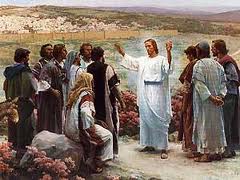
'You must come away to some lonely place all by yourselves and rest for a while'; for there were so many coming and going that the apostles had no time even to eat. So they went off in a boat to a lonely place where they could be by themselves.
But people saw them going, and many could guess where; and from every town they all hurried to the place on foot and reached it before them. So as he stepped ashore he saw a large crowd; and he took pity on them because they were like sheep without a shepherd, and he set himself to teach them at some length.
The Gospel of the Lord Praise to you, Lord Jesus Christ.
**************************
Gospel Reflection Saturday Fourth Week in Ordinary Time Mark 6:30-34
In taking his disciples away to a lonely place after their period of missionary work, Jesus highlights the value of rest and the importance of space in the midst of a busy schedule. There was much to be done, both for Jesus and his disciples. Yet, Jesus recognized that there were other values alongside the value of activity, even activity in the service of God. There was the value of being, of stepping back to spend time with oneself, with others and with God. Stepping back from our various activities can help to ensure that our doing, our work, is shaped by God’s purpose and desire. In the first reading, Solomon had just become king of Israel. There was much to be done for the young king. Yet, in that reading, we find Solomon stepping back from his work as king to spend time with the Lord in prayer, asking the Lord for the gift of the wisdom and discernment he would need for his work as king. He recognized that if he was to rule in the way the Lord wanted, he would need the Lord’s help. We all need to get that balance right in our lives between being and doing, between, on the one hand, being really present to others and to the Lord in prayer and, on the other hand, the many activities we need to engage in, some of them essential.
In the gospel reading, the prayerful rest that Jesus sought out for himself and his disciples didn’t actually materialize. When they arrived at the lonely place, people were there waiting for them and, as the compassionate shepherd, Jesus set himself to teach them at great length. Thereby, Jesus was showing his disciples and us the importance of another and higher value, the value of serving in love even those who unexpectedly disrupt our legitimate search for space, rest and prayer.
________________________________
The Scripture Readings are taken from The Jerusalem Bible, published 1966 by Darton, Longman & Todd Ltd. and used with the permission of the publishers. http://dltbooks.com/
The Scripture Reflection is made available with our thanks from his book Reflections on the Weekday Readings: The Word is near to you, on your lips and in your heart by Martin Hogan and published by Messenger Publications, c/f www.messenger.ie/bookshop/
_______________________________________
Sliocht as an chéad leabhar Ríthe. 3: 4-13
Tabhair do do shearbhónta croí tuisceanach le do phobal a rialú, chun an mhaith a aithint thar an olc.
Théadh an rí Solamh go Gibeón le híobairtí a dhéanamh ann, mar is ann a bhí an t-ardionad a ba mhó tábhacht; d’ofráladh an rí míle íobairt dhóite ar an altóir sin. I nGibeón nocht an Tiarna é féin i mbrionglóid oíche do Sholamh.
 Dúirt Dia: “Cibé rud is mian leat a fháil uaim, iarr orm é.”
Dúirt Dia: “Cibé rud is mian leat a fháil uaim, iarr orm é.”D’fhreagair Solamh:
“Thaispeáin tú barr cineáltais agus buanghrá do do shearbhónta Dáiví, m’athair, nuair a bhí sé ag caitheamh a bheatha faoi chuing na dílseachta agus na córa agus an ionracais chroí i do láthair; bhuanaigh tú an sárchineáltas agus an buanghrá sin dó nuair a thug tú mac le bheith ina shuí ina ríchathaoir inniu.
Agus anois, a Thiarna, a Dhia liom, tá rí déanta agat díomsa, do shearbhónta, mar chomharba ar Dháiví, m’athair. Ach níl ionam ach ógfhear gan oiliúint mar threoraí. Tá do shearbhónta i measc an phobail seo atá tofa agat, pobal atá chomh hiomadúil sin nach féidir a líon a áireamh ná a mheas. Tabhair do do shearbhónta croí tuisceanach le do phobal a rialú, chun an mhaith a aithint thar an olc; óir cé a d’fhéadfadh a bheith i gceannas ar an bpobal seo agat atá chomh líonmhar sin?”
Ábhar sásaimh ab ea é don Tiarna gur iarr Solamh a leithéid seo. Dúirt an Tiarna leis:
“Dé bhrí gurb é seo an rud a d’iarr tú agus nach fad saoil duit féin a d’iarr tú, ná saibhreas, ná bás do naimhde, ach thú a bheith in ann breith thuisceanach a thabhairt, déanaim duit ar an toirt mar a d’iarr tú. Bronnaim ort croí ciallmhar tuisceanach, i dtreo nach raibh do leithéid riamh romhat agus nach mbeidh do leithéid i do dhiaidh. Sea go deimhin, agus an rud nár iarr tú, bronnfaidh mé ort chomh maith é: saibhreas agus glóir, nach raibh a leithéid ag aon rí eile riamh (i gcaitheamh do shaoil)
Briathar an Tiarna Buíochas le Dia
Salm le Freagra Sm 118: 9-14
Freagra A Thiarna, múin do reachtanna dom.
1. Conas a mhairfidh an t-ógánach glan, ach le d’aitheanta a chomhlíonadh?
Iarraim thú le mo chroí go hiomlán; nár imí mé ó d’aitheanta. Freagra
2. Cuirim do bhriathar i bhfolach i mo chroí; sula ndéanfainn peaca ort.
Is beannaithe atá tú, a Thiarna; múin do reachtanna dom. Freagra
3. Is amhlaidh a d’admhaigh mé le mo bhruasa foraitheanta uile do bhéil.
Gairdím i slí d’fhorálacha amhail san uile shaibhreas. Freagra
SOISCÉAL
Go raibh an Tiarna libh. Agus le do spiorad féin
Sliocht as an Soiscéal naofa de réir Naomh Marc 6: 30-34 Glóir duit, a Thiarna.
Bhí siad mar a bheadh caoirigh gan aoire.
Tháinig na haspail le chéile timpeall ar Íosa agus d’inis siad dó a raibh déanta acu agus a raibh de theagasc tugtha acu. Dúirt sé leo:

“Tagaigí sibhse go dtí áit uaigneach ar leithligh agus glacaigí bhur suaimhneas tamall” – óir bhí mórán daoine ag teacht agus ag imeacht agus ní raibh am chun bia féin acu. D’imigh siad leo i mbád go dtí áit uaigneach ar leithligh. Agus chonaic mórán ag imeacht iad agus d’aithin siad iad, agus rith siad ann dá gcois as na cathracha uile agus bhain siad an áit amach rompu.
Ag teacht i dtír dó chonaic sé slua mór, agus ghlac sé trua dóibh mar go raibh siad mar a bheadh caoirigh gan aoire, agus thosaigh sé ag muineadh mórán nithe dóibh.
Soiscéal an Tiarna. Moladh duit, a Chriost
AN BÍOBLA NAOFA
© An Sagart
Fifth Sunday in Ordinary Time, Year A
The Beatitudes are how Jesus describes his own values in life and his wish for us
that we should live in tune with these advisories for the development of God's Kingdom.
FIRST READING
A reading from the book of the Prophet Isaiah 58:7-10
When will your light shine like the dawn
Thus says the Lord:Share your bread with the hungry, and shelter the homeless poor,
clothe the man you see to be naked and turn not from your own kin.

Then will your light shine like the dawn
and your wound be quickly healed over.
Your integrity will go before you and the glory of the Lord behind you. Cry, and the Lord will answer;
call, and he will say, 'I am here'.
If you do away with the yoke, the clenched fist, the wicked word,
if you give your bread to the hungry,
and relief to the oppressed,
your light will rise in the darkness, and your shadows become like noon.
The Word of the Lord Thanks be to God.
Responsorial Psalm Ps 111: 4-9, R/v1
Response The good man is a light in the darkness for the upright.
1. He is a light in the darkness for the upright: he is generous, merciful and just.
The good man takes pity and lends, he conducts his affairs with honour. Response
2. The just man will never waver: he will be remembered for ever.
He has no fear of evil news; with a firm heart he trusts in the Lord. Response
3. With a steadfast heart he will not fear; open-handed, he gives to the poor;
his justice stands firm for ever. His head will be raised in glory. Response
SECOND READING
A reading from the first letter of St Paul to Corinthians 2:1-5
During my stay with you, the only knowledge I claimed to have was about Jesus,
and only about him as the crucified Christ.
 When I came to you, brothers, it was not with any show of oratory or philosophy, but simply to tell you what God had guaranteed. During my stay with you, the only knowledge I claimed to have was about Jesus, and only about him as the crucified Christ. Far from relying on any power of my own, I came among you in great 'fear and trembling' and in my speeches and the sermons that I gave, there were none of the arguments that belong to philosophy; only a demonstration of the power of the Spirit. And I did this so that your faith should not depend on human philosophy but on the power of God.
When I came to you, brothers, it was not with any show of oratory or philosophy, but simply to tell you what God had guaranteed. During my stay with you, the only knowledge I claimed to have was about Jesus, and only about him as the crucified Christ. Far from relying on any power of my own, I came among you in great 'fear and trembling' and in my speeches and the sermons that I gave, there were none of the arguments that belong to philosophy; only a demonstration of the power of the Spirit. And I did this so that your faith should not depend on human philosophy but on the power of God.The Word of the Lord Thanks be to God.
Gospel Acclamation Jn 8:12
Alleluia, alleluia!
I am the light of the world, says the Lord,
anyone who follows me will have the light of life.
Alleluia!
GOSPEL
The Lord be with you. And with your spirit
A reading from the Gospel according to Matthew 5: 13-16 Glory to you, Lord
You are the light of the world.
Jesus said to his disciples:
 'You are the salt of the earth. But if salt becomes tasteless, what can make it salty again? It is good for nothing, and can only be thrown out to be trampled underfoot by men.
'You are the salt of the earth. But if salt becomes tasteless, what can make it salty again? It is good for nothing, and can only be thrown out to be trampled underfoot by men.'You are the light of the world. A city built on a hill-top cannot be hidden. No one lights a lamp to put it under a tub; they put it on the lamp-stand where it shines for everyone in the house.
In the same way your light must shine in the sight of men, so that, seeing your good works, they may give the praise to your Father in heaven.'
The Gospel of the Lord Praise to you, Lord Jesus Christ.
The scripture readings are taken from THE JERUSALEM BIBLE, published by Darton, Longman and Todd Ltd and used with permission of the publishers.
For homily resources for this Sunday's Gospel click here: https://www.catholicireland.net/sunday-homily/
Sliocht as Íseáia, Fáidh 58:7-10
Ansin scallfaidh do sholas amach mar an maidneachan
Seo mar a deir an Tiarna:
Do chuid aráin a roinnt le lucht ocrais, dídean a thabhairt do bhochtáin gan teach gan treabh,
éadach a chur ar an té a fheiceann tú nocht
agus gan faillí a dhéanamh i do dhualgas i leith do mhuintire.

Ansin scallfaidh do sholas amach mar an maidneachan
agus is gearr go dtaga cneasú ar do chréachtaí.
Rachaidh d’fhíréantacht romhat amach
agus glóir an Tiarna i do dhiaidh.
Ansin, má ghlaonn tú, tabharfaidh an Tiarna freagra ort;
nuair a scairtfidh tú, déarfaidh sé: “Seo anseo mé.”
Má dhíbríonn tú an leatrom as do chúrsaí,
bagairt na méire agus an chaint urchóideach,
má thugann tú do chuid aráin don ocrach
agus a sháith don duine dearóil,
éireoidh do sholas sa dorchadas agus beidh do ghruaim ina loinnir mheán lae.
Briathar an Tiarna Buíochas le Dia
Salm le Freagra Sm 111:4-9, R/v1
Freagra Lonraíonn an dea-dhuine sa dorchacht do dhaoine cneasta.
1. Lonraíonn sé sa dorchacht do dhaoine cneasta: is trócaireach é, is fial, is ionraic.
Bíonn an dea-dhuine carthanach airleacthach, riarann sé a ghnó go ceart onórach. Freagra
2. Ní chorrófar an fíréan choíche: mairfidh a chuimhne go brách na breithe.
Ní chuirfidh drochscéal eagla air; is daingean a chroí, is e an Tiarna a dhóchas. Freagra
3. Is dílis daingean a chroí gan eagla; feicfidh sé a naimhde agus iad á dtreascairt.
Dáileann sé a chuid go fial ar lueht an ghátair.Maireann a fhéile go brách agus choíche. Freagra
DARA LÉACHT
Sliocht as céad Litir Naomh Pól chuig Coirintigh 15: 3-8. 11
Fad a bheinn in bhur measc gan aon ní eile a aithint ach Íosa Críost agus eisean arna chéasadh.

I dtaca liomsa, a bhráithre, nuair a tháinig mé chugaibh, níor tháinig mé ag fógairt [rúndiamhair] Dé le hardnós cainte ná eagna. Shocraigh mé i m’aigne fad a bheinn in bhur measc gan aon ní eile a aithint ach Íosa Críost agus eisean arna chéasadh. Is mé a bhí go lagbhríoch in bhur measc agus mé lán d’uamhan agus d’eagla. Agus ní ar bhriathra mealltacha na heagna daonna a bhí mo scéal agus m’fhógra ag brath ach ar fhoilsiú an Spioraid agus na cumhachta, i dtreo nach ar eagna dhaonna a bheadh bhur gcreideamhsa bunaithe ach ar chumhacht Dé.
Briathar an Tiarna Buíochas le Dia
Alleluia Véarsa Eo 10: 27
Alleluia, alleluia!
Éisteann mo chaoirigh le mo ghlór, agus aithním iad, agus leanann siad mé.
Alleluia!
SOISCÉAL
Go raibh an Tiarna libh. Agus le do spiorad féin
Sliocht as Soiscéal naofa de réir Naomh Eóin 5: 13-16
Is sibhse solas an domhain
 San am sin dúirt Íosa lena dheisceabail:
San am sin dúirt Íosa lena dheisceabail:“Is sibhse salann na talún. Ach má éiríonn an salann leamh, cad a dhéanfaidh goirt arís é? Níl tairbhe ann feasta chun rud ar bith, ach é a chaitheamh amach mar a ngabhfar de chosa ann.
Is sibhse solas an domhain. Cathair ar mhullach cnoic ní féidir í a cheilt. Ná ní lastar lampa chun é a chur faoi bhéal na peice, ach in airde ar an gcrann solais mar a dtugann sé solas dá mbíonn sa teach.
Sibhse mar an gcéanna, bíodh bhur solas ag taitneamh os comhair daoine chun go bhfeicfidís bhur ndeaghníomhartha agus go nglóireoidís bhur nAthair atá ar neamh.
Soiscéal an Tiarna. Moladh duit, a Chriost
AN BÍOBLA NAOFA
© An Sagart


